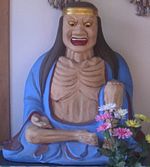- Datsue-ba
-
Datsue-ba (奪衣婆, lit. "old woman who strips clothes") is an old woman who sits at the edge of the Sanzu River in the Buddhist underworld. At the river, she has two primary duties.
According to Japanese Buddhist folklore (mostly from Japan's Pure Land sects), when a child dies its soul has to cross the Sanzu River. Traditionally, when a person dies, it is believed that they can cross the river at three different spots depending on how they lived their lives. Since children have not accumulated enough experiences, however, they are unable to cross. At the river's edge, the souls of deceased children are met by Datsue-ba. There, she strips the children of their clothes and advise them to build a pile of pebbles on which they can climb to reach paradise. But before the pile reaches any significant height, the hag and underworld demons maliciously knock it down. The Buddhist bodhisattva Jizō saves these souls from having to pile stones eternally on the bank of the river by hiding them in his robe.
When a soul is that of an adult, Datsue-ba forces the sinners to take off their clothes, and the old-man Keneō hangs these clothes on a riverside branch that bends to reflect the gravity of the sins. If the sinner arrives with no clothes, Datsu-ba strips them of their skin. Various levels of punishment are performed even at this early stage. For those who steal, for example, Datsueba breaks their fingers, and together with her old-man consort, she ties the head of the sinner to the sinner's feet.
Popular culture
Datsue-ba makes an appearance in the Megami Tensei games as a recruitable character.
References
Japanese mythology Mythic texts Kojiki | Nihon Shoki | Fudoki | Kujiki | Kogo Shūi | Hotsuma Tsutae | Nihon Ryōiki | Konjaku Monogatarishū | Shintōshū

Japanese creation myth Takamagahara mythology Izumo mythology Hyuga mythology Human age Mythical locations Major Buddhist figures Seven Lucky Gods Shinto deities | Japanese deities | Sacred objects | Japanese religions Categories:- Japanese legendary creatures
- Buddhist mythology
- Japanese mythology stubs
- Buddhism stubs
Wikimedia Foundation. 2010.

